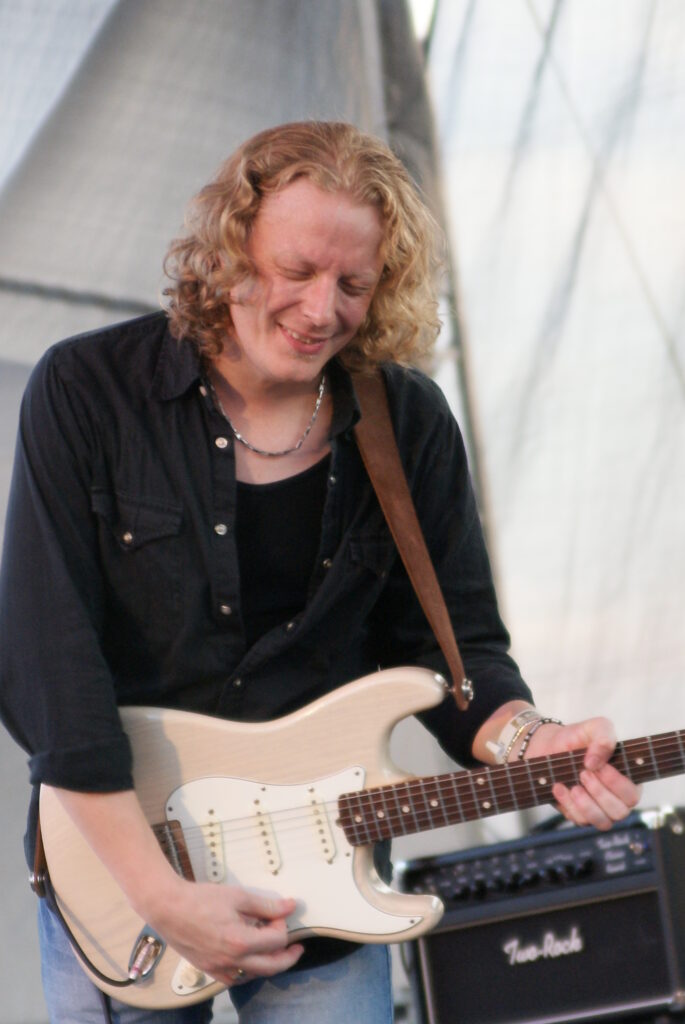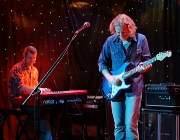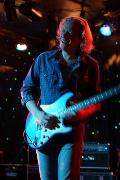We’ve talked about British blues guitarist Matt Schofield here a few times in recent months, from his new album to his appearances at the Western Maryland Blues Festival and at Pittsburgh’s Club Cafe. Tomorrow, he’ll be appearing at Wheeling’s Heritage Music BluesFest, with his latest album, Anything But Time, having earned album of the month honors in both the August edition of Guitarist magazine and the September issue of MOJO.
We had a chance to chat with Schofield earlier this week during a short break on his tour. Here’s what he told us about the new album, learning to play guitar, the differences between American and British audiences, and much more…
BluesPowR Blog: Hi, Matt. Thanks for talking with us. How’s the tour going for you?
Matt Schofield: It’s been great. It’s been long, and a lot of gigs, a lot of miles. We’ve basically done pretty much six nights a week since the end of May, apart from two weeks back in Europe. So it’s been great – played in all different parts of the country.
BPB: You’ve got the SVL “Daytona” guitar on tour with you?
MS: I do. I also have another SVL, called the Fifty-Nine, which is also now known as “B.B.” because B.B. King signed it for me. That’s its matching sister.
BPB: Have you noticed much difference between American and British audiences as you’ve toured?
MS: Yes, definitely the American audiences are much more demonstrative of their enthusiasm for the band during the show, which we like. We’re a high-energy band, so in order to keep the energy coming, it’s nice to get it back from the crowd. Certainly in the U.K., people are much more reserved in their appreciation. Not that we don’t have very loyal fans and not suggesting that they don’t enjoy it as much as the American audiences, they just don’t feed it back to you as much in the same way.
BPB: I caught you here in Pittsburgh a few weeks ago at the Club Cafe, which is a pretty intimate setting. Do you have a preference for those smaller, more intimate clubs or larger venues and festivals?
MS: It’s all good. There’s a certain size of club that’s comfortable for us in order for us to do what we do – it’s more a stage thing than a size of the crowd thing. I do enjoy playing a big festival, a big stage, because of the energy that you just get from that size of event. But I’m sure if I only did those, I’d miss the little clubs as well.
BPB: Well, you get the chance to play another festival this coming weekend. You’re doing the Heritage Music BluesFest in West Virginia on Saturday. I see Jon Cleary is on the schedule right after you – he played with you on the new album?
MS: He did. He came down to the studio for a night and ended up playing on three tracks on the record, but I think we did four with him just that evening, straight off the floor. It was great to have him come in and do that.
BPB: Any chance you guys might play a couple of tunes together?
MS: I suspect there’s a chance that something like that might happen. He played with us in Holland a few weeks ago when we went back over there at the beginning of July for the North Sea Jazz Festival. He was there as well, so he did a few tunes with us on that show.
BPB: Neat. So, do you have a favorite city or venue you’ve played this time around?
MS: Wow, it seems like we’ve done so many shows, I’d have to think about that for a while. The Hagerstown festival in Maryland was really a lot of fun – I seem to remember that one really being something good. We did the Burlington Jazz Festival up in Vermont, and that was really nice. It was like a club show but as part of the festival, you know. Certain ones just stick in your mind. They’re all so different, in different parts of the country; we always have a nice time here on the West Coast. Portland was great the other night, and Walla Walla was very nice up there as well.
BPB: You’re 33 now?
MS: Yea, I’ll be 34 in two weeks.
BPB: Well, happy birthday to you. How old were you when you started playing?
MS: I was about 12 when I got going seriously. I’ve been gigging since the age of 13.
BPB: So you’ve been doing it for a few years now?
MS: Twenty years this year, yea.
BPB: Who or what was it that inspired you to pick up the guitar?
MS: I’d grown up with my dad’s records. He’s got a great blues record collection, so I’d always been hearing that. I’ve been listening to B.B. King as far back as I can remember, Muddy Waters and all, there was a lot of that. But the main thing was a video my dad showed me when I was 12, about to turn 13 – a video of B.B., Albert Collins and Stevie Ray Vaughan and they were all jamming down at the New Orleans Jazz & Heritage Festival and they’d captured this video of it, and that was it for me – just the way the three of them were jamming together and they all had such unique sounds and all sounded so great together. I just thought “I want to be like one of those guys”, “I want to be the fourth guy up there,” is how I felt. So that was a big thing. Then the following year my dad took me to a concert to see B.B., and it was also Buddy Guy, Dr. John, and the Fabulous Thunderbirds down the road in San Francisco – that was completely life-changing as well, seeing those guys live at the age of 13, so those were the big catalysts.
Then my dad would say “Well okay, if you like Stevie Ray, you’ve got to check out Albert King, because that’s where he’s getting it from,” so he kind of taught me to listen as well.
BPB: In terms of your idols…
MS: B.B. King, Albert King, Freddie King, Albert Collins, Hendrix, a bit of Clapton, both the Vaughan brothers. And then later on after I’d been playing a while, about the age of 16 or so, I started hearing guys like Robben Ford and John Scofield, guys who still had a solid grounding in the blues but were bringing some jazz vocabulary into it, and so from there, I started to listening some of the bluesy kind of jazz, and listening to a lot of non-guitar stuff: piano, saxophone, Hammond organ. Then a little bit later on, we discovered bands like the Meters and things like that from New Orleans, and that was pretty important, more to the band as a whole than my playing specifically, but just that kind of New Orleans groove that they get down there.
BPB: Well, it’s a great style of playing, and it’s been pegged many different ways. How do you describe yourself as a musician?
MS: I consider myself a blues player. I don’t consider myself a jazz player at all. A lot of people say it’s jazzy, and the questions people ask me the most are probably the things that define it, and people always say “What are those outside notes that you’re using?”
I say I’m not using any outside notes, I’m actually using more inside notes. I’m playing in the chord tone, so that’s perhaps why people hear it as jazzy, but it’s actually just playing the chord. To me, it’s just making it fit melodically… If you listen to B.B. or Albert King, even in the simplicity of their playing, they’re always making the chord changes and bringing out the melody, and it sings. So, just trying to do my own version of that really, with perhaps a slightly more expanded vocabulary than those guys use.
BPB: You were recently named by Guitar & Bass magazine as one of the top 10 British guitar players of all time, alongside the likes of Eric Clapton and Peter Green. Who on that list would you say you admire the most?
MS: That’s a good question, because I never really listened a great deal to the British players, not that I don’t appreciate them, but it was always kind of straight-to-the-source for me more. I’ve got so much respect for Eric Clapton, as much from a career perspective as anything, in just sustaining himself right at the forefront of guitar playing for 40-up years now. Talking to John Porter, who produced the record and knew Eric back in the sixties, he said really nobody was doing that the way Eric was doing it at that point… But I probably listen to Jeff Beck more than Eric these days – I think Jeff’s amazing and always pushing the envelope of guitar playing, not really blues specifically. But when it comes to blues, Eric really made it very accessible for everyone, in much the same way as I think Stevie Ray did for a lot of people of my generation. It’s kind of an accessible version that allows you to follow back from there and find out where they got it.
BPB: Who haven’t you had a chance to play with that you’d like to?
MS: B.B. King. I got to spend a little bit of time with him a couple of weeks ago at the North Sea Jazz Festival, where he signed one of my guitars… He wrote the book – everybody that plays guitar now owes B.B. something, whether they know it or not.
BPB: Of those you’ve recorded, do you have a favorite album?
MS: Oh, that’s tricky, they’re all like different children, you know. So it’s hard to pick your favorite kid. The new one was certainly the most pleasurable to make for me, working with John. I always produced my own records before, not through reasons of ego necessarily, just it was like unless I could get someone I really trusted to do it, I’d rather do it myself. John was one of the people I trusted to do a record, and it was great – it was the most stress-free and fun time I’ve had making a record. So I hope we get to do that again with him sometime – we hit it off nicely and he doesn’t insert himself into your music. He makes you sound as much like you as he can. It was a thrill to be (in New Orleans), I’ve never been before, and we obviously so love the music from there. So just hanging out there and soaking up the vibe was worth it.
BPB: Are there other things you really like about the new album compared to the others?
MS: Well, the way the band is at the moment, we’ve got a really good thing. The previous one we did with a different line-up, which I needed to do at that point, but when Kevin (Hayes) joined the trio last year, we didn’t know how long that was going to be at the time, it was “Do you want to do some gigs in America?” then. The trio is very important to the three people involved in it – it only works with the right guys basically, is what I’m getting at. So it works better than we even imagined with Kevin on drums, and we just went on from there. And it was “Okay, now we’ve gotta’ make a record of this line-up.”
BPB: You write a lot of your own songs – how do they usually come to you?
MS: It’s all different ways. I write a lot with my partner, my girlfriend Dorothy, who’s done a lot of the tunes, so it can be all different ways: she can have an idea for a title of a song and we write some lyrics together, or she’s got a whole set of lyrics and I take them and put them to music, or I’ve got some music… These days, a lot, I write the music just in my head, without even the guitar in my hands, and it just kind of comes – you end up with a song in your head and then you go and figure out how to play it. Everyone in the band is very open: I try and have people in the band that I don’t have to tell them how to play – just trust them with what they’re gonna’ bring to it, so there’s a large element of that as well.
BPB: Anything else you’d like to add or say to your fans?
MS: Just thank you very much for making us feel so welcome here in the U.S. on our second tour, and there’s gonna’ be a lot more of it next year as well. It seems to be the way things are heading for us, being out here a lot. And that’s fine by us.
BPB: We’re glad you’re able to spend a bit of time here now.
MS: Well, so are we – to me, it’s where the music came from, so to be able to bring it back and do our version of it and have people accept it, is really cool for me.




